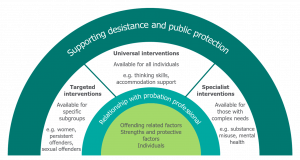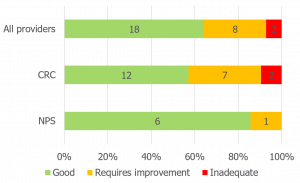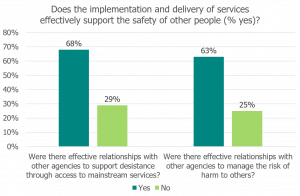Services

Key findings
- To provide the range of services required, organisations must have a clear understanding of their service users, recognising their diversity and their differing needs and strengths.
- There should be a strong mix of internal and external services, and of universal, targeted and specialist services, providing the necessary range and depth of intervention. Service users have highlighted the need for practical support as well as interventions enabling them to make the necessary changes to their own lives.
- Opportunities to provide integrated services and pathways of delivery, involving a range of services, should be well-developed.
- Monitoring ‘treatment integrity’ is essential, ensuring that all services are delivered as intended. Evaluations are required to examine whether services have their intended impacts, and whether they work better with some individuals than others.
Background
The timely provision of a good range of high-quality services and interventions is at the heart of successful probation delivery, alongside strong local strategic partnerships and the critical relationships between individual practitioners and service users.
Rehabilitation and reintegration must be a collective enterprise, with a range of statutory and voluntary services having a role to play alongside probation in tackling the problems leading to offenders committing crime. By working more effectively with these partners, and by all public services meeting their obligations in respect of offenders, we can improve individual outcomes and protect victims and communities.
(Ministry of Justice, 2018)
Summary of the evidence
Understanding service users
To provide the range of services required, organisations must have a clear understanding of their service users, recognising their diversity and their differing needs and expectations. Service users’ risks and needs must be the paramount consideration in deciding on the appropriateness of differing services, which, in combination, should provide a holistic package. As highlighted in the desistance literature, services should also build upon service users’ personal strengths and skills. Particular efforts need to be made to anticipate future demands.
Providing a range of services
While many service users place value in being given the tools and skills to enable them to make the necessary changes to their own lives, some have emphasised the need for more practical support. There needs to be a strong mix of internal and external services, and of universal, targeted and specialist services, providing the necessary range and depth of intervention to meet the full range of service user needs. Sufficient flexibility and options are required to cater for those with often chaotic and unstable circumstances, and more vulnerable groups such as women, those with a disability, or those with mental health and/or addiction problems. The services should be easy to access and person-centred, with all efforts having been made to identify and remove barriers to access.

Working with other providers
A comprehensive range of services requires a diverse range of professional skills and expertise, some of which are provided by other providers and agencies. Collaboration with other providers, agencies and the local community is integral to how services are planned, ensuring that the services meet service user needs and allow for appropriate innovation. Opportunities to provide integrated services and pathways of delivery, particularly for service users with multiple and complex needs, should be well-developed.
Effective liaison with other providers and agencies requires clear and sound inter-agency protocols, including, for example, referral processes. Information exchange is particularly important – in relation to specific cases and in general, helping to influence policies and practice. Service users have highlighted the need to avoid any disconnect between the services available in the community and the information provided by probation staff.
Social inclusion facilitates long term desistance and is a key component of social justice. Community agencies should thus be encouraged and supported to undertake their responsibilities to probation service users as members of society. Where necessary, advice should be provided to help other agencies make sure that their services are relevant and readily accessible.
Some service users pose significant risks to the public, and there is evidence highlighting the potential benefits from joint working at a local level, involving, for instance, the police, the voluntary sector, health services and local authorities, with these agencies using their skills and knowledge in a complementary way.
Monitoring and evaluating services
It is well established that the likelihood of achieving successful outcomes is impacted by quality of delivery, and that putting procedures in place to monitor quality will improve outcomes. Monitoring ‘treatment integrity’ is essential, involving other providers and agencies where appropriate, ensuring that all services are delivered as intended, with remedial actions taken when necessary. There should be a focus upon identifying aspects for improvement and good practice.
When implementing new services, attention needs to be given to the necessary evaluation. Just because something makes intuitive sense does not mean it will work and there can be unintended consequences. Consideration should also be given to whether specific services and interventions work better with some individuals than others. Currently, there is good evidence supporting the use of certain types of intervention, but detail is often lacking, particularly when considering differing sub-groups, differing combinations of needs, sequencing issues and differing pathways to desistance. Robust evidence on both the costs and benefits of differing approaches and interventions is also generally lacking.
It is critical that new ‘evidence-led’ innovations are tested and evaluated, so that the evidence base underpinning the delivery of probation services continues to develop and broaden.
(Fox and Albertson, 2020)
In our 2018/2019 probation inspections, we considered whether each probation provider had a comprehensive range of high-quality services in place to support a tailored and responsive approach for all service users. Across the 28 inspections, 18 providers received a ‘Good’ rating, with eight receiving ‘Requires improvement’, and two rated as ‘Inadequate’. The range and quality of services was generally deemed to be of a higher standard in the NPS divisions than across the CRC areas.

Approximately four in five of the interviewed responsible officers across our 2019-2019 inspections felt that there were effective relationships with other agencies to (i) support desistance and (ii) manage risks of harm to others, which we found to be strongly associated with the quality of delivery: inspectors were more likely to judge that implementation/delivery supported (i) the service user’s desistance and (ii) the safety of other people when the responsible officer responses were positive.

Council of Europe (2010). Recommendation CM/Rec (2010)1 of the Committee of Ministers to member states on the Council of Europe Probation Rules.
Council of Europe (2010). Explanatory Memorandum on the Council of Europe Probation Rules.
Fox, C. and Albertson, K. (2020). Innovation and the Evidence Base, HM Inspectorate of Probation Academic Insights, 2020/01. Manchester: HM Inspectorate of Probation.
Ministry of Justice. (2014). Transforming Rehabilitation: a summary of evidence on reducing reoffending. 2nd edn. London: Ministry of Justice.
Sapouna, M., Bisset, C., Conlong, A. and Matthews, B. (2015). What Works to Reduce Reoffending: A Summary of the Evidence. Edinburgh: Scottish Government (Justice Analytical Services).
Back to Organisational delivery Next: Information and facilities
Last updated: 18 December 2020



